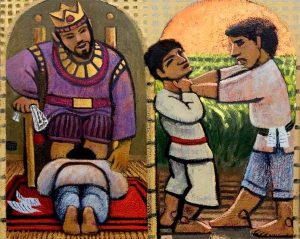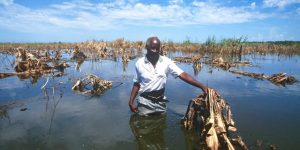Nerys writes: Today’s Gospel, Matthew 18.21-35, contains a story about debts that can’t be paid and the need to let them go. A wealthy slave had found himself in an impossible situation. In the Roman world, slaves were known to speculate with their masters’ resources in order to accumulate money to buy their freedom. Things had gone badly wrong for this one. He had run up an astronomical debt which he could never repay. The king orders the slave’s possessions to be sold along with the slave himself, his wife and his children. In desperation, the man falls to his knees and promises to pay back everything he owes if his master would just be patient. It is an absurd promise but the king, moved by his plight, has pity on him and releases him of his debt, giving him back his life out of the goodness of his heart. Within moments, the slave has an opportunity to repay the favour by releasing a poorer colleague from a much smaller debt. Instead, he grabs him by the throat, demanding his due and, when the man asks him to be patient just as he had asked the king, he has him thrown into jail.
 Artist: Wayne Forte
Artist: Wayne Forte
There is no doubt that Climate Change-related disasters are throwing people into debt across the world but it is much worse in some countries than others. On an individual level, a family in rural Malawi or Bangladesh struck by floods or drought, will lose the annual harvest they depend upon for sustenance and income. The only way to buy necessities and seeds for the following year is to borrow money. Survival becomes more and more difficult as the family struggles to service the loan and when the next disaster strikes, they lose everything. The same is happening on a national level. Mozambique, for example, was devastated in 2019 by Hurricane Idai, one of the worst tropical cyclones to affect Africa on record. The government was forced to take out loans from wealthy countries to build new roads, hospitals and schools. Then, last year, another cyclone destroyed some of the infrastructure that had been rebuilt. And in March this year, flooding caused by Hurricane Freddy wiped out the harvest in many areas and impacted the livelihoods of thousands of fishermen and farmers. Each disaster has increased the debt which the government of Mozambique needs to repay, driving the country deeper into extreme poverty.

Least developed countries like Mozambique, Malawi and Bangladesh are urgently calling on the governments of wealthy industrialised countries like Scotland to recognise the impact on their economies of extreme weather events caused by climate change and to take responsibility for it. They argue that it is only right that the countries and the companies which have contributed most to increasing greenhouse gas emissions should pay for the loss and damage they have been causing through many decades of pollution. At COP 27, last year’s United Nations Climate Conference, governments agreed to create an international fund to support lower-income counties hit hardest by the climate crisis. Scotland became the first industrialised nation to commit funding to support the recovery of communities affected most, pledging an initial £2 million at COP26 in Glasgow, rising to £7 million last year. But that is just a drop in the ocean and many other countries and the large fossil fuel companies who are literally fuelling the crisis, are reluctant to contribute a penny. Right now, the fund is not yet in use as those who could easily provide the aid that is needed seek to find ways to avoid bearing the cost.
The whole narrative of the Plagues and the Exodus in the Old Testament readings this month illustrates the connection between environmental disruption and human injustice in a brutal and horrifying way. Had Pharaoh allowed the enslaved Israelites to be set free, his people wouldn’t have suffered such losses. Time and time again Pharaoh refused to listen to the voice of God calling for a just society. In the end he reaped the consequences of his intransigence.
Our God is a God of justice, but also, as Psalm 103 reminds us, a God of compassion and love, slow to anger and rich in mercy. All these qualities are seen in the king of Jesus’ parable who seeks to govern his people by example. When he set his slave free of the burden of impossible debt, his concern was not only for that individual but for his whole kingdom. His intention was for that man to experience forgiveness so that he would in turn forgive others. He was setting an example of costly, sacrificial giving in order to change the attitudes of a whole society of people towards one another.
The parable is presented in Matthew as a response to a question by Peter, voicing the thoughts of the disciples about forgiveness. ‘Lord, if another member of the church sins against me, how often should I forgive? As many as seven times?’ Peter would have considered himself to be extremely generous to be suggesting forgiveness that stretches to the seventh offence but, as ever, Jesus shocks both him and us. Suddenly we get a glimpse of God’s kingdom where forgiving others, releasing them from impossible debt, is a way of life.
Inspired by this vision, we need to lead the way by our example, living and working to create a more just and compassionate world where individuals and countries are set free from the burden of debt caused by Climate Change. While it is important for us to seek to minimise our personal impact on the environment, this is not enough. We need to pray and to raise our voices on behalf of those least responsible for the climate crisis who are being hit hardest and are left paying for the damage. As we stated at Alexander’s baptism a few weeks ago, our task is to live and work for the kingdom of God.
You may wish to use this prayer of thanksgiving by Val Brown, Head of Christian Aid Scotland, as you bring your response to God.
God of all people, of all creatures;
Thank you for the world that you have created,
where each ecosystem lives in delicate balance
and where the world produces the food
and the clean water that we all need to sustain life.
The bounty of the harvest is a testament to the wonder of creation
and yet we know that all creation is groaning.
The weather isn’t what it was
and that throws out the created balance,
making it harder for farmers to grow the food we all need.
Thank you for the efforts of people locally, nationally and globally to care for your world:
for the people who use their creative energy to work for solutions,
for the people who raise their voices to call for justice,
for the people who make small changes every day
to tread more lightly on the earth.
May we all learn to live simply, so that others can simply live. Amen






